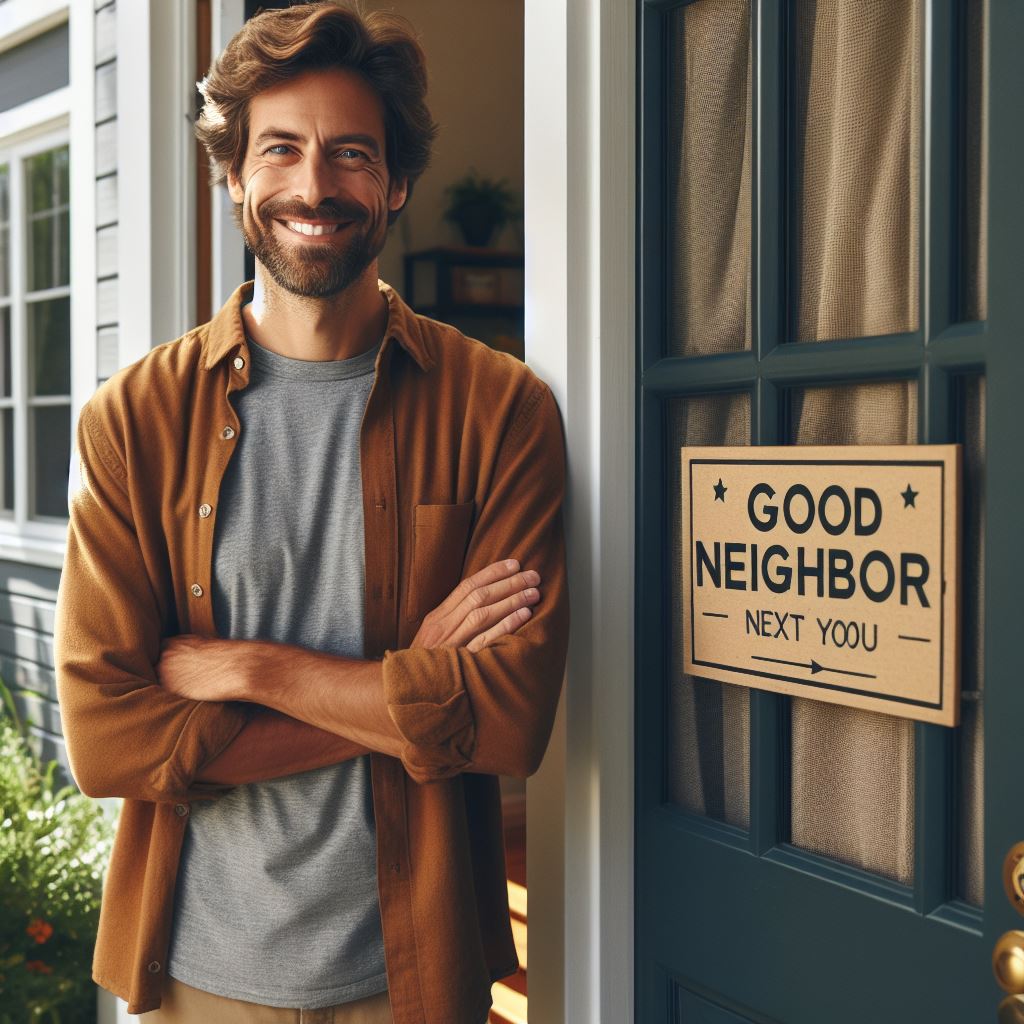Introduction
The Good Neighbor Next Door program, administered by the U.S. Department of Housing and Urban Development (HUD), is a unique initiative aimed at revitalizing communities and promoting homeownership.
Encourage law enforcement officers, teachers, firefighters, and emergency medical technicians to become homeowners in designated revitalization areas.
Eligible participants can buy homes at 50% off, committing to reside solely for 36 months.
Established in 1997, the Good Neighbor Next Door program was originally part of the Teacher Next Door initiative, which sought to address the issue of affordable housing for educators.
Recognizing the positive impact that such programs could have on various professions and communities, it expanded over time to include law enforcement officers, firefighters, and emergency medical technicians.
The program operates by incentivizing eligible professionals to move into targeted neighborhoods in need of revitalization.
The program aims to attract individuals committed to serving communities by offering homes at a fraction of their market value.
Through their presence, these homeowners contribute not only to the stability and safety of the neighborhood but also to its overall vibrancy and sense of community.
Qualifications and Eligibility Criteria
Explanation of the Targeted Professions
The Good Neighbor Next Door program, administered by the U.S. Department of Housing and Urban Development (HUD), aims to revitalize communities by encouraging professionals in certain fields to purchase homes in designated revitalization areas.
These targeted professions include teachers, law enforcement officers, firefighters, and emergency medical technicians (EMTs).
By incentivizing these professionals to live in these neighborhoods, the program seeks to foster safer and more stable communities while also providing an opportunity for public servants to become homeowners.
Requirements for Applicants
- Employment and Service Requirements: To qualify for the Good Neighbor Next Door program, applicants must be employed full-time as a teacher, law enforcement officer, firefighter, or EMT in the same area where the home they wish to purchase is located. Additionally, they must commit to residing in the property for at least 36 months as their sole residence.
- Proof of Good Standing: Applicants must provide documentation proving their status as a public servant and their good standing in their respective professions. This may include employment verification letters, certifications, or licenses.
- Prior Homeownership Restrictions: While the program aims to assist individuals who may not have previously owned a home, it does not exclude those with prior homeownership experience. However, applicants must agree to sell any other property they own within 90 days of closing on the Good Neighbor Next Door home. This requirement ensures that the program benefits those who are in genuine need of affordable housing assistance.
Overall, the Good Neighbor Next Door program offers a unique opportunity for eligible professionals to become homeowners while contributing to the improvement of underserved communities.
By meeting the specified qualifications and eligibility criteria, applicants can take advantage of this program’s benefits and make a positive impact on both their own lives and the neighborhoods they serve.
Read: Mastering Home Price Talks: Top Negotiation Tactics
Benefits offered through the program
The Good Neighbor Next Door program, administered by the U.S.
Department of Housing and Urban Development (HUD), offers a plethora of benefits aimed at fostering community development and homeownership opportunities. Let’s delve into the advantages this initiative presents:
Discounted home prices
One of the standout features of the Good Neighbor Next Door program is the opportunity for eligible participants to purchase homes at significantly discounted prices.
Qualified law enforcement officers, teachers, firefighters, and emergency medical technicians can acquire homes in designated revitalization areas for 50% off the listed price.
This substantial discount opens the door to homeownership for individuals who might otherwise find it financially challenging to enter the market.
Financing options and mortgage assistance
Navigating the realm of mortgages can be daunting, especially for first-time homebuyers.
The program offers various financing options and mortgage assistance to facilitate the purchase process.
Participants can explore FHA-insured mortgage options with lower down payment requirements, making homeownership more accessible and affordable.
Exclusive opportunity for homeownership in desirable areas
The program provides a unique opportunity for individuals to become homeowners in desirable neighborhoods and communities.
By targeting revitalization areas, participants contribute to the enhancement and stabilization of these neighborhoods while enjoying the perks of residing in sought-after locations.
This exclusive opportunity adds an element of prestige and desirability to the program.
Potential impact on revitalizing communities
Beyond the individual benefits, the Good Neighbor Next Door program has the potential to catalyze community revitalization efforts.
By incentivizing homeownership and occupancy in designated areas, the program contributes to stabilizing property values, reducing crime rates, and fostering a sense of community pride.
The presence of dedicated professionals as neighbors can also inspire positive social and economic change within these neighborhoods.
In essence, the Good Neighbor Next Door program offers an array of benefits, from discounted home prices and financing assistance to the revitalization of communities.
Through this initiative, participants not only realize their dreams of homeownership but also play a vital role in shaping vibrant and thriving neighborhoods.
Read: VA Loans Simplified for First-Time Buyers

Understanding the home selection process
In order to participate in the Good Neighbor Next Door program, potential buyers must understand the home selection process.
This section will provide an overview of the bidding process, the factors considered in the selection of buyers, and emphasize the importance of a timely response to available listings.
Overview of the bidding process
- The home selection process in the Good Neighbor Next Door program involves a unique bidding system.
- Qualified buyers have the opportunity to submit bids on available properties within designated areas.
- The bidding period typically lasts for a specified time frame, and interested buyers must submit their bids within this window.
- Once the bidding period ends, the highest acceptable bid is determined, and the winning buyer is notified.
- If the highest bid is not accepted, the process reopens, and interested buyers can submit new bids.
Factors considered in the selection of buyers
- When selecting buyers, certain factors are taken into account to ensure fairness and compliance with program requirements.
- Buyers must be eligible government employees or designated nonprofit organizations.
- Preference is given to buyers employed in areas targeted for revitalization and to nonprofits that serve those areas.
- Buyers must also meet other eligibility criteria such as not currently owning a home and fulfilling credit and financial requirements.
- These factors are thoroughly evaluated to determine the suitability of buyers for the Good Neighbor Next Door program.
Importance of timely response to available listings
- One crucial aspect of the home selection process is the timely response to available listings.
- When a property becomes available, interested buyers must swiftly review the listing and decide if they are interested.
- Failure to respond promptly may result in missing out on the opportunity to bid on the property.
- Considering the competitive nature of the program, timely response is essential to secure a chance to purchase the desired home.
- Buyers are encouraged to regularly monitor the listings and be prepared to act swiftly when a property becomes available.
Understanding the home selection process in the Good Neighbor Next Door program is crucial for potential buyers.
It is essential to familiarize oneself with the bidding process, factors considered in the selection of buyers, and the importance of timely response to available listings.
By being well-informed and proactive, buyers can increase their chances of successfully participating in the program and acquiring their dream home.
Read: Negotiation Tactics for First-Time Home Buyers
Tips and strategies for participating in the Good Neighbor Next Door Program
Researching eligible properties
When delving into the Good Neighbor Next Door program, thorough research is paramount.
Start by familiarizing yourself with eligible properties in your desired area.
Utilize online resources and databases to identify available homes that meet the program’s criteria.
Pay close attention to property listings and their corresponding HUD identification numbers.
This information will streamline your search and ensure you’re targeting properties that qualify for the program.
Engaging with local real estate agents
Collaborating with knowledgeable real estate agents can significantly enhance your experience with the Good Neighbor Next Door program.
Seek out agents who specialize in HUD homes and possess a deep understanding of the program’s intricacies.
These professionals can provide invaluable guidance, helping you navigate the process with confidence.
Be sure to communicate your specific preferences and priorities, allowing your agent to tailor their search to your needs.
Understanding the nuances of the application process
Familiarize yourself with the nuances of the application process to maximize your chances of success.
Thoroughly review the program’s eligibility requirements and documentation guidelines to ensure you’re adequately prepared.
Pay close attention to deadlines and submission procedures, adhering to all guidelines meticulously.
Consider seeking guidance from housing counselors or HUD-approved agencies to clarify any uncertainties and streamline the application process.
Preparing financially for homeownership
Financial preparedness is essential when participating in the Good Neighbor Next Door program.
Assess your current financial situation and take steps to strengthen your position as a prospective homeowner.
This may involve improving your credit score, saving for a down payment, and addressing any outstanding debts.
Explore available financing options and consider consulting with mortgage lenders to determine the best approach for your unique circumstances.
By taking proactive steps to prepare financially, you’ll position yourself for success in achieving homeownership through the Good Neighbor Next Door program.
In summary, conducting thorough research, engaging with experienced real estate professionals, understanding the application process, and preparing financially are key strategies for successfully participating in the Good Neighbor Next Door program.
By following these tips, you’ll be well-equipped to navigate the program’s requirements and secure your dream home.
Read: Navigating FHA Loans: Tips for New Buyers
Success stories and testimonials
Real-life Experiences of Program Participants
The Good Neighbor Next Door initiative has transformed lives in countless ways, serving as a beacon of hope for individuals seeking affordable housing options while revitalizing communities.
Here are a few inspiring tales from program participants:
- Sarah’s Journey to Homeownership: Sarah, a single mother of two, had always dreamed of owning her own home but found the prospect daunting due to financial constraints. Through the Good Neighbor Next Door program, she discovered an opportunity to purchase a home at a fraction of its market value. With the support of the initiative, Sarah not only secured a comfortable residence for her family but also gained a sense of stability and pride in homeownership.
- John’s Renewed Sense of Community: John, a retired teacher, felt disconnected from his neighborhood after years of living there. However, upon learning about the program, he decided to participate and found himself rejuvenated by the prospect of becoming an active member of his community once again. Through the Good Neighbor Next Door initiative, John not only found a new home but also forged meaningful connections with his neighbors, fostering a sense of belonging and camaraderie.
Positive Impact on Individuals and Communities
The ripple effects of the Good Neighbor Next Door program extend far beyond individual success stories, leaving an indelible mark on communities nationwide:
- Strengthening Community Bonds: By encouraging participants to become invested members of their neighborhoods, the initiative fosters a sense of unity and cooperation among residents. As individuals take pride in their homes and surroundings, communities flourish, with residents working together to create safer, more vibrant neighborhoods.
- Economic Revitalization: The program’s focus on revitalizing distressed areas injects much-needed economic stimulus into communities, attracting new residents and businesses while bolstering property values. This revitalization not only improves the quality of life for current residents but also attracts prospective homeowners and investors, spurring further growth and development.
Therefore, the Good Neighbor Next Door initiative stands as a testament to the transformative power of community-driven initiatives.
Through real-life success stories and positive impacts on individuals and communities alike, the program continues to pave the way for a brighter, more inclusive future for all.
Frequently Asked Questions about the Good Neighbor Next Door Program
Clarification on common eligibility doubts
Many potential participants in the Good Neighbor Next Door (GNND) program often have questions regarding their eligibility.
One common query revolves around who qualifies as a “good neighbor.” The program is designed for law enforcement officers, teachers, firefighters, and emergency medical technicians who serve designated revitalization areas.
These individuals must commit to residing in the purchased property for at least three years.
Another frequent concern is whether participants can purchase any home they desire.
While the GNND program offers a wide selection of available homes, not every property qualifies.
Homes listed under the program are specifically designated by the Department of Housing and Urban Development (HUD) and are subject to availability in eligible areas.
Addressing concerns about the home buying process
Navigating the home buying process can be daunting, especially for first-time buyers. Prospective participants often inquire about financing options.
The GNND program allows qualified individuals to purchase homes at a substantial discount, typically 50% off the list price, making homeownership more attainable.
Additionally, participants can utilize FHA, VA, or conventional financing to fund their purchase.
Another common question pertains to property condition. While GNND homes are sold “as-is,” participants have the opportunity to inspect the property before committing to the purchase.
This allows buyers to assess any necessary repairs or renovations and budget accordingly.
The program’s obligations and responsibilities
Participants frequently seek clarification on their obligations and responsibilities after purchasing a GNND home.
One primary responsibility is fulfilling the occupancy requirement of residing in the property as their primary residence for a minimum of three years.
Failure to meet this obligation may result in financial penalties or disqualification from future HUD programs.
Additionally, participants must maintain the property and adhere to all local ordinances and regulations.
This includes timely payment of property taxes, homeowner association fees (if applicable), and any necessary repairs or upkeep.
By addressing these frequently asked questions, prospective participants can gain a better understanding of the Good Neighbor Next Door program and determine if it aligns with their homeownership goals and eligibility criteria.
Conclusion
In delving into the intricacies of the Good Neighbor Next Door program, it’s clear that its benefits extend far beyond the surface.
Through offering substantial discounts on homes in revitalization areas, this initiative not only provides affordable housing options but also fosters community development.
By incentivizing teachers, law enforcement officers, firefighters, and emergency medical technicians to invest in these neighborhoods, the program cultivates a sense of stability and security, which are fundamental for thriving communities.
Moreover, the opportunity to purchase homes at half their appraised value presents a unique chance for eligible individuals to build equity and secure their financial future.
For those who qualify, the Good Neighbor Next Door program represents more than just a real estate opportunity—it’s a chance to make a meaningful impact.
Whether you’re a dedicated educator, a committed law enforcement officer, a brave firefighter, or a compassionate medical technician, your contribution to your community can extend beyond the classroom, patrol car, fire station, or ambulance.
By taking advantage of this program, you not only secure an affordable home but also become an integral part of neighborhood revitalization efforts.
Don’t let this opportunity pass you by; explore the possibilities and take the first step towards homeownership and community enrichment today.
In the end, the Good Neighbor Next Door program stands as a beacon of hope and opportunity in our quest for vibrant, safe, and inclusive communities.




